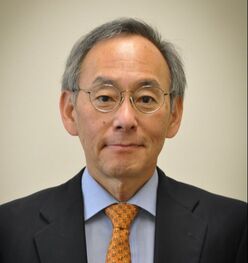
Secretary Steven Chu interwove the essential themes of change and sustainability and explained the relationship between historical facts and current scientific findings throughout his keynote presentation. Ice-core data from the past 800,000 years shows that CO2 concentration in the atmosphere is highly correlated with temperature [1]; yet, today, the cumulative worldwide CO2 emission is skyrocketing. Human activities have been breaking the equilibrium of the natural carbon cycle on Earth, leaving a “smoking gun” of evidence for the already gigaton global warming challenge.
“If you don't change direction, you will end up where you are heading,” says Chinese philosopher Lao Tze. In order to change the current path, Dr. Chu emphasizes that we must “transit to better solutions,” and he believes sustainability is that stepping stone. But this evolution requires giant leaps in different directions, including economic, societal, and technological. And, while storage capability is a key element in deploying more renewable energy solutions, positive changes in agricultural practices and dietary habits can noticeably contribute to lowering the pace of climate change.
Globally, states use Gross Domestic Product to measure their wealth, which leads to a competition for production and consumption. But with accelerated climate change and its impact on the environment and human life, Secretary Chu argues that it is time to acknowledge that a sustainable future requires the redefinition of what the world calls “wealth.” Only if it includes quality of life and social aspects, can real sustainability be achieved.
Keynote summary by SISE Fellows Sepehr Sabeti, Suzane Vieira Carneiro and Louis Cocks
“If you don't change direction, you will end up where you are heading,” says Chinese philosopher Lao Tze. In order to change the current path, Dr. Chu emphasizes that we must “transit to better solutions,” and he believes sustainability is that stepping stone. But this evolution requires giant leaps in different directions, including economic, societal, and technological. And, while storage capability is a key element in deploying more renewable energy solutions, positive changes in agricultural practices and dietary habits can noticeably contribute to lowering the pace of climate change.
Globally, states use Gross Domestic Product to measure their wealth, which leads to a competition for production and consumption. But with accelerated climate change and its impact on the environment and human life, Secretary Chu argues that it is time to acknowledge that a sustainable future requires the redefinition of what the world calls “wealth.” Only if it includes quality of life and social aspects, can real sustainability be achieved.
Keynote summary by SISE Fellows Sepehr Sabeti, Suzane Vieira Carneiro and Louis Cocks
Watch the full video of the session here.


